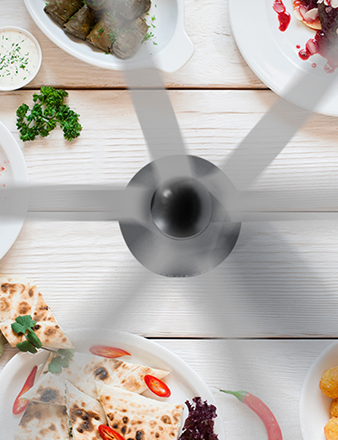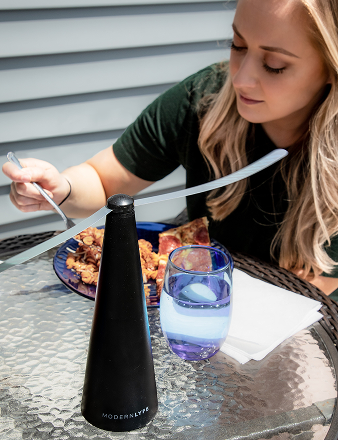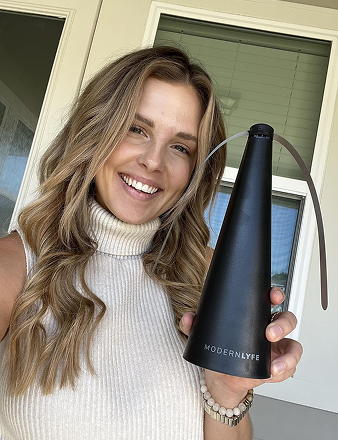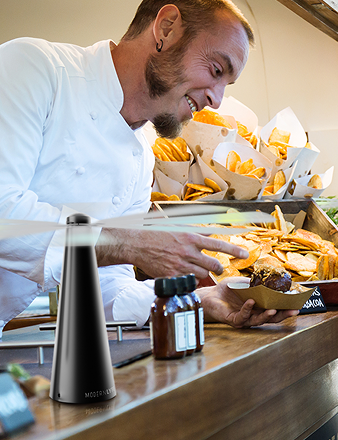You have a strong food truck concept and a great menu. The next critical step is securing the necessary permits. This process is non-negotiable and foundational to building a legitimate, trustworthy business.
Permits are not just bureaucratic hurdles; they are your license to operate legally and safely. They exist to protect public health and ensure that every mobile kitchen meets professional standards.
Why Permits Are Non-Negotiable
Attempting to operate without the proper licenses is a critical business error. These regulations ensure safety for everyone, from your suppliers to your customers. A fully permitted truck signals professionalism and commitment to quality.
The food truck industry is expanding rapidly. The number of trucks in the United States is projected to reach approximately 48,000 in 2025, a significant increase from around 35,000 in early 2022. While lower overhead is a major advantage, the competition is fierce. Proper licensing provides a competitive edge.
Permits as Your Operational Blueprint
View your permits as a master checklist for running a safe and legal operation. Each one is essential to your business's integrity.
- Build Trust: A health permit is a promise to your customers that you adhere to the highest food safety standards.
- Operate Legally: Your business license makes your company official, allowing you to operate in a city or county without the risk of fines or shutdowns.
- Unlock Opportunities: Major events, from music festivals to corporate lunches, require proof of all permits before granting access.
Securing the right permits transforms your mobile kitchen from a concept into a legitimate, operational enterprise ready to serve the public.
Permits are a significant startup cost that must be included in your budget. As you outline initial expenses, explore options for funding a startup to ensure you have the capital to cover all requirements.
Here is a direct breakdown of the process.
Core Food Truck Permits Explained
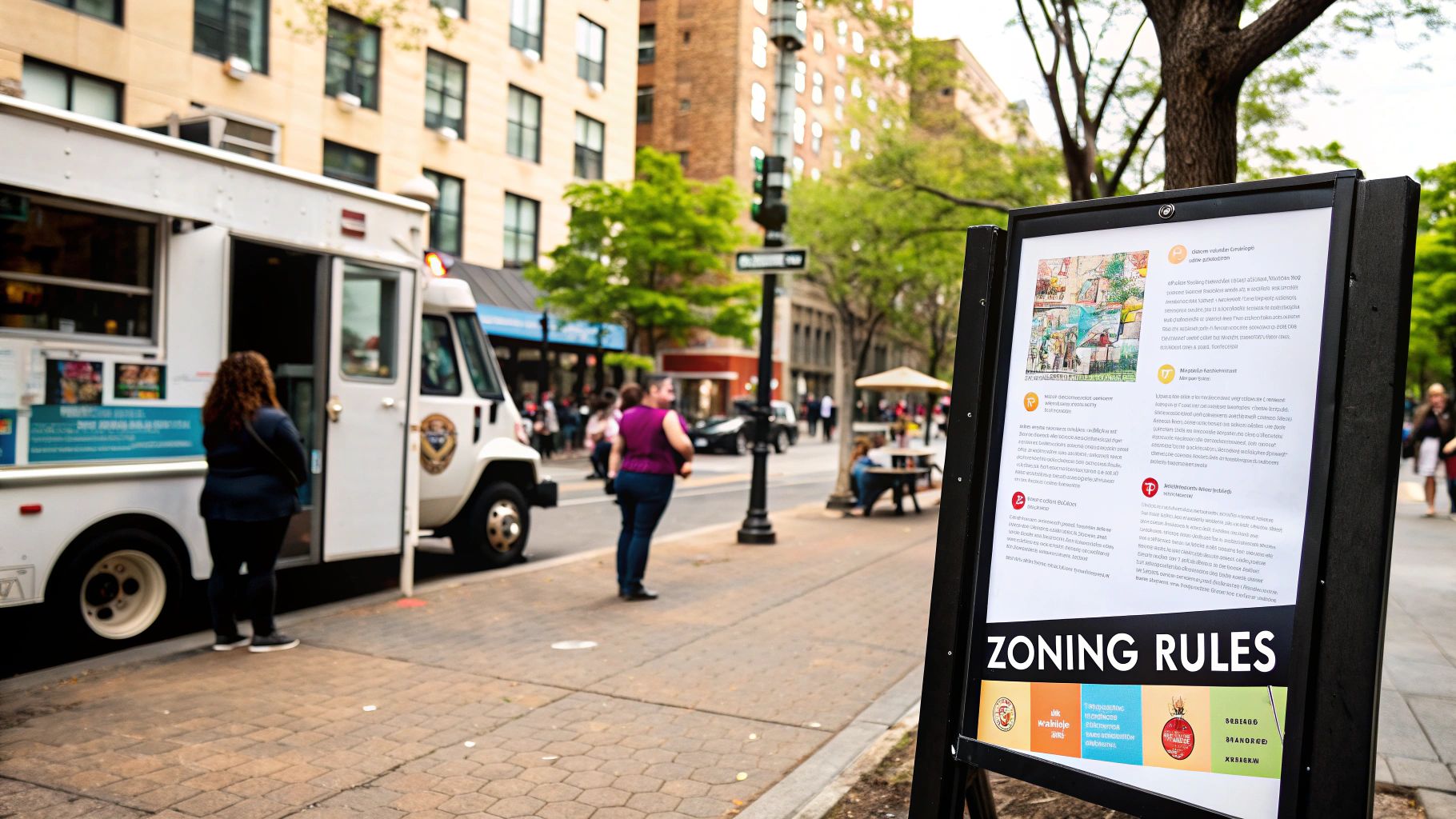
Acquiring food truck permits is a process of collecting a set of essential credentials. Each license unlocks a different aspect of your business, and together they provide the legal authority to operate.
Breaking the process into clear, manageable steps makes it far less intimidating. Every permit you secure is a tangible step toward opening your service window with confidence.
The Health Department Permit: Your Primary Requirement
This is the most critical permit. The Health Department Permit, or Food Service License, is the official confirmation from regulators that your mobile kitchen is a safe and sanitary environment.
You cannot legally sell food without it. This permit requires a detailed inspection of everything from refrigeration temperatures and water systems to handwashing stations. Health departments also often require compliant food labels that list ingredients and potential allergens.
Business and Vehicle Licensing: Making It Official
Next, you must establish your food truck as a legal business entity. A Business License from your local city or county government formalizes your company and grants you the right to operate within that jurisdiction.
Simultaneously, your truck must be street-legal. Like any vehicle, it requires a Vehicle License and Registration from the DMV. Be aware that its size and weight will likely classify it as a commercial vehicle, which may have its own set of rules and inspections.
Specialized Permits for Specific Operations
After securing the basics, you may need additional permits based on your menu and location. The most common include:
- Fire Safety Certificate: If you use propane or open-flame equipment, the local fire department must inspect your setup. This certificate verifies that your systems are installed safely and meet all fire codes.
- Seller's Permit: This authorizes you to collect sales tax from customers, issued by your state's tax agency. It is also known as a sales tax permit.
- Food Handler's Permit: Most health departments require you and your employees to be certified in safe food handling. This typically involves a short course and an exam.
Managing these permits correctly impacts your bottom line. Food trucks can achieve an average profit margin of 6.2% in the U.S., compared to the 1% to 3% margins typical for brick-and-mortar restaurants. Reaching this potential depends on effectively managing permit fees and renewals, which can become a major operational cost if neglected.
Your Essential Permit Application Checklist
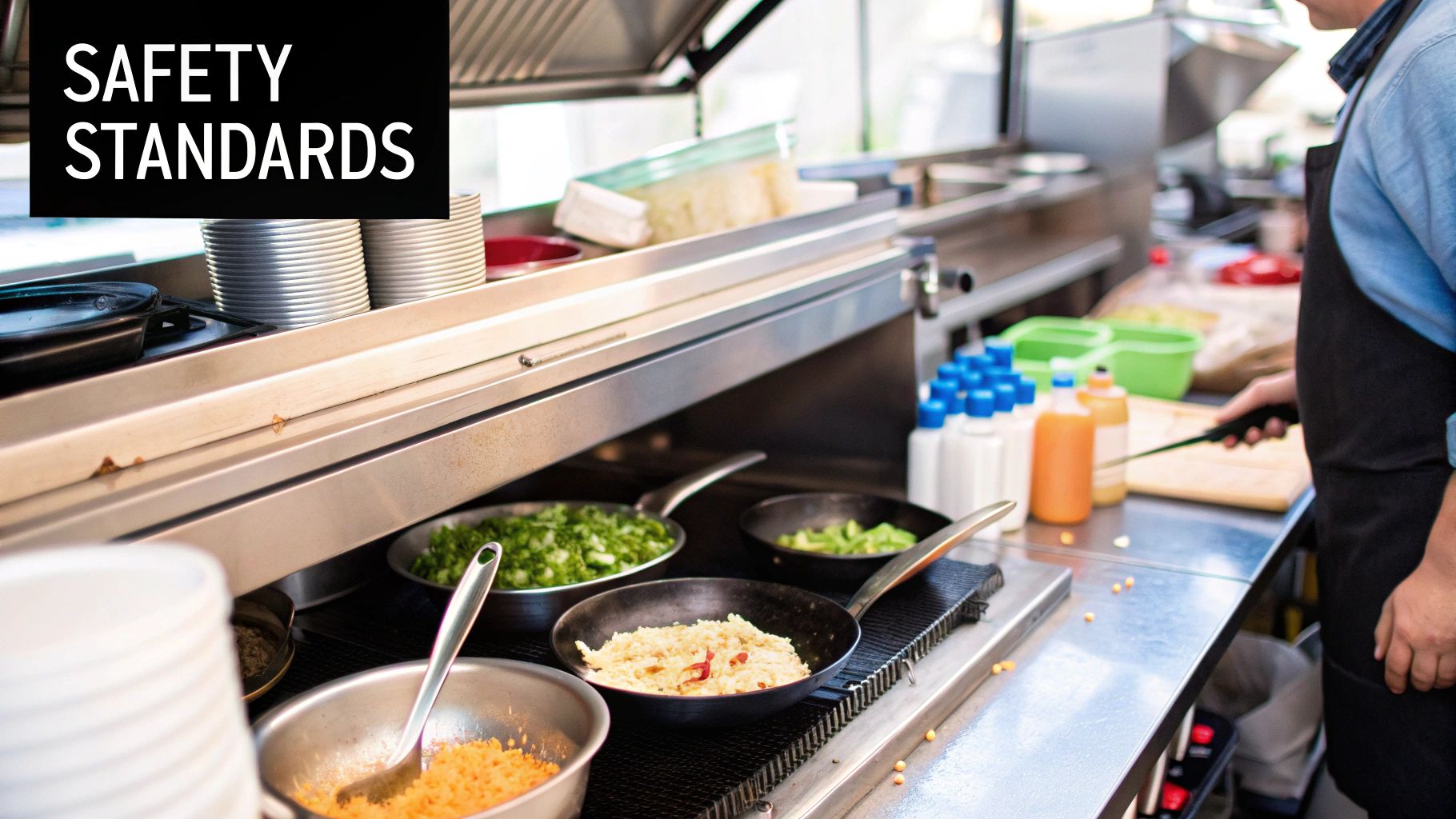
Starting a food truck involves significant paperwork. The best way to avoid delays is to get organized before starting the first application.
Think of it as your business mise en place. Having all documents ready demonstrates professionalism to regulators. This preparation can be the difference between a smooth launch and weeks of bureaucratic delays.
This table outlines the most common documents you will need. Use this checklist as your roadmap to a successful application.
Essential Documents for Your Food Truck Permit Application
| Document or Information | Purpose | Where to Obtain It |
|---|---|---|
| Business License | Grants official permission to operate a business in your city or county. | Your local city hall or county clerk’s office. |
| Employer Identification Number (EIN) | A federal tax ID required for almost all business-related paperwork. | The official IRS website (it’s a free and fast online process). |
| Food Handler's Permit | Certifies that you and your staff have completed food safety training. | State-approved food safety training programs (often available online). |
| Vehicle Registration & VIN | Proves you legally own and have registered your truck for road use. | Your state’s Department of Motor Vehicles (DMV). |
| Commissary Agreement | A signed contract with a commercial kitchen for prep, storage, and cleaning. | Licensed commercial kitchens or commissary facilities in your area. |
| Proposed Menu | Allows the health department to assess the risk level of your food items. | This is a document you create yourself. |
| Food Truck Schematics | Detailed diagrams of your truck’s layout for health and fire inspections. | Often provided by your food truck builder or an architect. |
Having these documents is non-negotiable. An incomplete application is often automatically rejected, forcing you to restart the process.
Foundational Business Documents
Before addressing food service, you must prove your business is a legitimate legal entity. These are the basics that every agency will verify first.
You need proof of your Business Registration, which shows your structure (LLC, sole proprietorship, etc.). You also need an Employer Identification Number (EIN) from the IRS, which is necessary even without employees. Finally, your general Business License from your city or county is required to operate legally in that area.
Your Food and Safety Plan
Once your business is established, the focus shifts to public health. The health department's requirements are strict, and your paperwork must be perfect.
They will review your detailed menu to understand your food preparation and assess potential risks. Crucially, you will need a signed commissary agreement—a contract with a licensed commercial kitchen for food prep, supply storage, and waste disposal. This is a mandatory requirement in most jurisdictions. For more details, our guide on food safety in restaurant guidelines covers best practices for compliance.
Truck-Specific Information
Finally, regulators need to verify that your mobile kitchen is safe, properly equipped, and street-legal.
This means providing the Vehicle Identification Number (VIN) and registration to prove ownership. You must also submit Food Truck Schematics—the blueprints of your kitchen. These detailed diagrams show inspectors the layout of sinks, refrigeration, cooking surfaces, and water tanks, helping them verify compliance before an on-site inspection.
How to Navigate the Application and Inspection Process
With your documents prepared, it is time to engage with the system. This phase involves working through the official process—a series of steps that lead to approved permits if followed correctly.
The process is sequential. You often cannot apply for a health permit until your business license is processed, and final inspections cannot be scheduled until the health permit is approved. Following the correct order is the key to a smooth experience.
This infographic outlines the core application workflow.
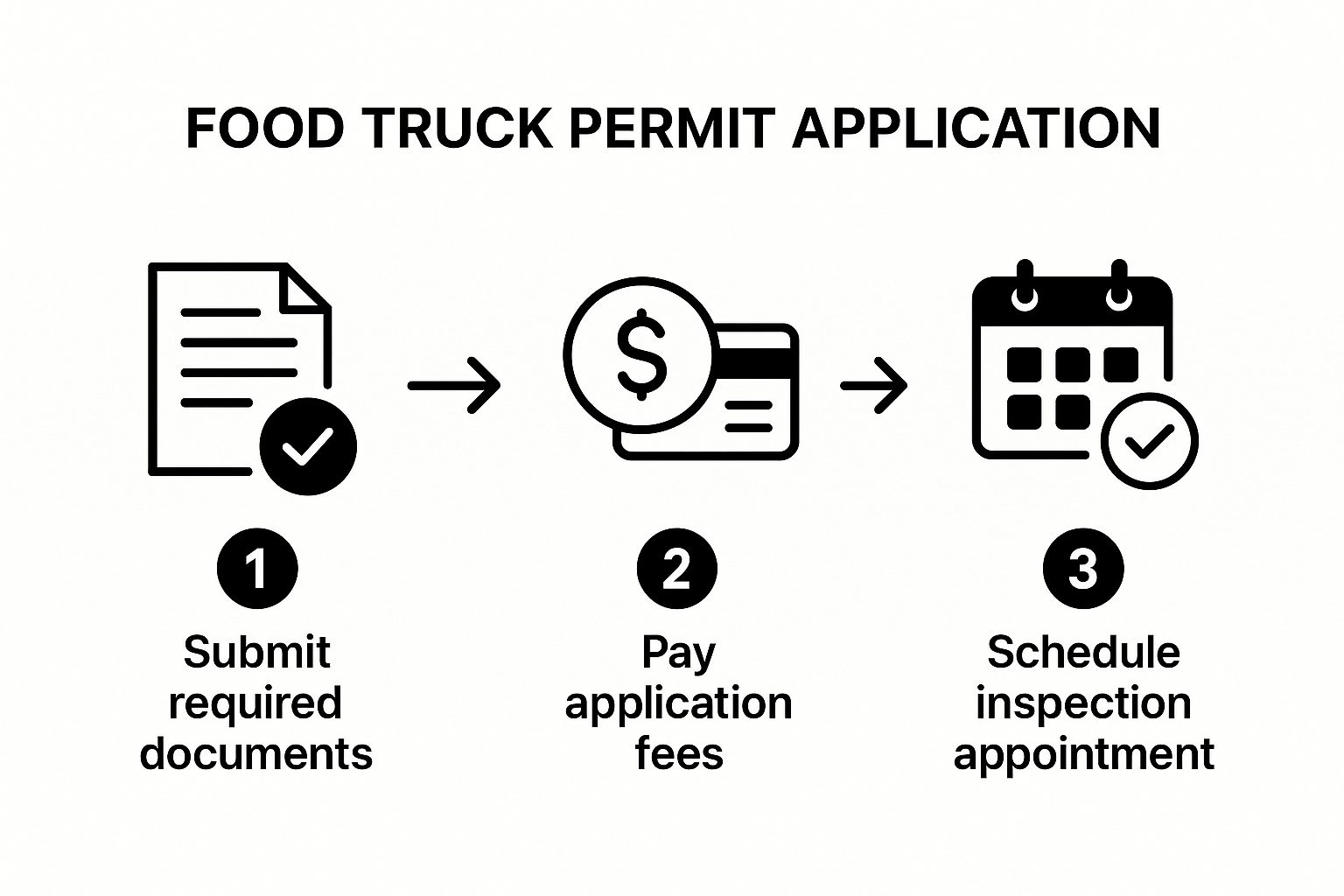
Submitting a complete document package is the first major step, unlocking the payment and inspection phases.
Your Step-by-Step Application Playbook
The application process is direct but demands attention to detail. Each step builds on the previous one, so executing them in order is crucial to avoid delays.
- Identify the Right Agencies: Determine exactly which city and county departments you must work with. This typically includes the local health department, the city clerk’s office (for the business license), and the fire department.
- Submit Your Applications: Complete all required forms for each agency. Many cities use online portals, but some may require in-person submission. Triple-check every field for accuracy before submitting.
- Pay All Associated Fees: Each permit has a fee that must be paid to proceed. Keep meticulous records of all payments and receipts for your business files.
Preparing for the Critical Inspections
Passing inspections is the final stage of the permitting process. This is when officials physically verify that your mobile kitchen is safe, sanitary, and compliant with all codes. You will face two primary reviews.
An inspection is not just a test; it is a validation of your commitment to public safety. A successful inspection signals to regulators and customers that your business is built on professionalism and care.
The Health Inspection This is the most thorough inspection. The health inspector will examine your truck closely, focusing on areas like:
- Proper Temperatures: Refrigerators and freezers must maintain food at safe temperatures, typically below 40°F.
- Sanitation Stations: They will confirm you have the required multi-compartment sinks for washing, rinsing, and sanitizing, plus a separate handwashing sink with hot water, soap, and paper towels.
- Food Storage: Raw meats must be stored separately from ready-to-eat foods to prevent cross-contamination.
The Fire Safety Inspection If your truck uses propane or any open-flame cooking equipment, the local fire department will conduct an inspection. They focus on the safe installation and maintenance of your cooking systems. They will check your fire suppression system, ensure you have the correct class of fire extinguishers, and verify that your commercial kitchen ventilation systems are clean and functional.
Understanding Local Rules and Jurisdictional Differences
Securing your initial food truck permits is not a one-time task. A significant challenge for new owners is that regulations are hyper-local; a permit that makes you legal in one town may be useless just a few miles away. You must navigate a complex web of rules that can change from one zip code to the next.
Each city or county has its own rulebook. An activity permitted in one area—like late-night service downtown—might be forbidden in another. This patchwork of laws requires you to become a local expert for every location where you plan to operate.
Big City Rules vs. Small Town Freedom
The operating environment in a major city versus a smaller town can be vastly different. Large cities often have a dense food truck scene, leading to stricter and more complex regulations.
For example, a major city might enforce:
- Designated Vending Zones: You may be restricted to operating only in specific, pre-approved spots, which can be limited and highly competitive.
- Proximity Restrictions: Many cities prohibit food trucks from setting up within a certain distance—such as 500 feet—of an existing brick-and-mortar restaurant.
- Strict Operating Hours: Your permit may ban operation late at night in residential areas or during rush hour on busy streets.
In contrast, a smaller town might be more flexible. With fewer food trucks, there is less competition and often simpler rules. You will likely find more flexible parking options and fewer restrictions on your hours.
Mastering local rules is a core business strategy, not just a compliance task. Knowing where you can legally and profitably operate dictates your entire route plan and revenue potential.
How to Become a Local Regulation Expert
To understand the specific food truck permit requirements for each location, you must conduct thorough research. Do not rely on a single source; cross-reference information to get a complete picture.
Start with the official government websites for the city and county you are targeting. Look for sections on business licensing, public health, and mobile food vending. These sites provide the most accurate, up-to-date information directly from the source.
Next, connect with other operators. No one knows the local rules better than those already working in the area. Join local food truck associations or participate in online forums to connect with veteran owners. They can provide invaluable, on-the-ground advice about unwritten rules, specific inspectors, and prime locations. This insider knowledge is crucial for building a business that can thrive anywhere.
Staying Compliant and Managing Permit Renewals
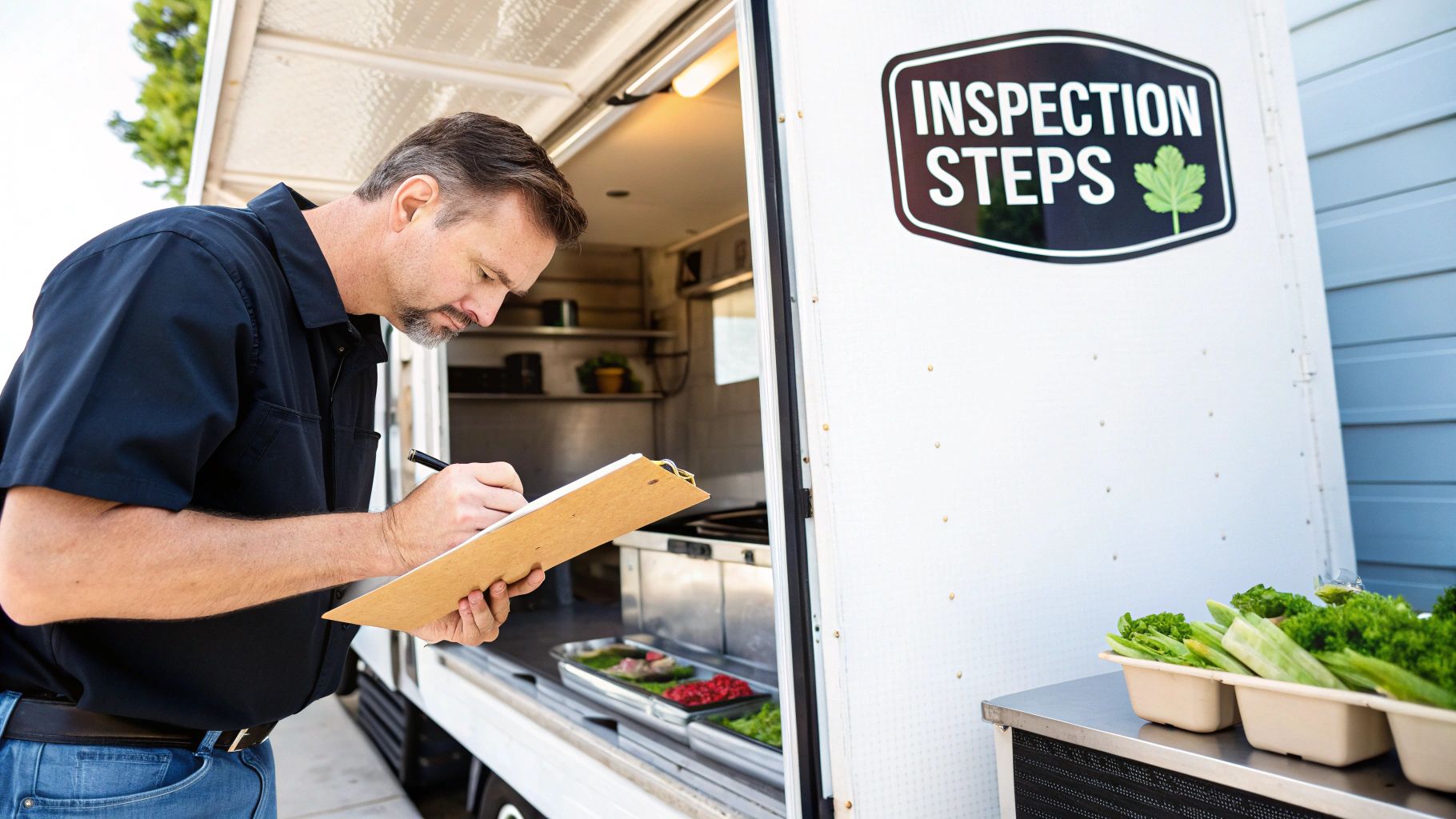 Obtaining your food truck permits is the starting line, not the finish. Long-term success depends on maintaining compliance and managing renewals.
Obtaining your food truck permits is the starting line, not the finish. Long-term success depends on maintaining compliance and managing renewals.
Think of your permits as a subscription that keeps your business legally operational. A lapsed permit can result in heavy fines or a forced shutdown until the issue is resolved.
Often, it is minor infractions that cause problems, like parking in a restricted zone or failing to display your latest inspection report. Surprise inspections are common, so you must always be prepared.
Build a Simple Compliance Calendar
The key to avoiding these issues is organization. Do not wait for a renewal notice to arrive. Successful operators create a compliance calendar to track every important date.
This can be a basic digital calendar on your phone or computer. For each permit, set reminders for 60, 30, and 10 days before its expiration. This provides an adequate buffer to prepare paperwork and budget for renewal fees.
Proactively managing renewals transforms compliance from a stressful task into a predictable business routine. It protects your revenue and maintains your good standing with local authorities.
Common Violations to Avoid
A clean record simplifies the renewal process. Regulators are more accommodating to operators with a history of compliance. Beyond keeping permits current, you must be diligent in daily operations. To understand what inspectors focus on, it is helpful to review common restaurant health code violations, as many apply directly to food trucks.
Some of the most frequent violations include:
- Improper Food Temperatures: This is a critical violation. Failing to keep hot food hot and cold food cold is an immediate red flag for any health inspector.
- Commissary Log Issues: If required to use a commissary, you must maintain detailed logs. Missing or incomplete records can jeopardize your health permit.
- Parking Violations: Operating outside designated zones or for longer than permitted is a fast way to receive a fine and attract negative attention.
Got Questions About Food Truck Permits? We’ve Got Answers.
Navigating food truck permits can be complex. It is normal to have questions. Here are clear answers to some of the most common inquiries to help you build a solid plan.
How Much Am I Really Going to Spend on Permits?
The total cost varies significantly depending on your location. In a smaller town, you might pay a few hundred dollars. In a major city like New York or Los Angeles, the cost could be closer to $5,000.
This total is a combination of fees for your business license, health department permit, fire safety certificate, and other local requirements. Research the specific costs for your target city and include this as a line item in your startup budget.
How Long Will It Take to Get All My Permits?
Be patient. The timeline can range from a few weeks to several months. You are dealing with multiple government agencies, and factors like application backlogs or inspection scheduling can cause delays.
The best advice is to start the permit process much earlier than you think is necessary. Postponing this step is a recipe for expensive delays that will keep your truck off the road.
Securing permits is a marathon, not a sprint. Starting early and maintaining organized paperwork is the only way to ensure you are ready for your grand opening.
Do I Need New Permits for Every City I Want to Work In?
Yes, in nearly all cases. A permit from one city or county is not valid in another. They are not transferable.
If you plan to operate at events in different towns, you will need a separate set of permits for each jurisdiction. Before parking in a new location, research its requirements and confirm you have the necessary approvals from local authorities.
Keep your food fresh and your customers happy with MODERN LYFE. Our elegant fly fans provide the perfect solution for protecting your service window from pests. Learn more and shop now at modernlyfe.com.

